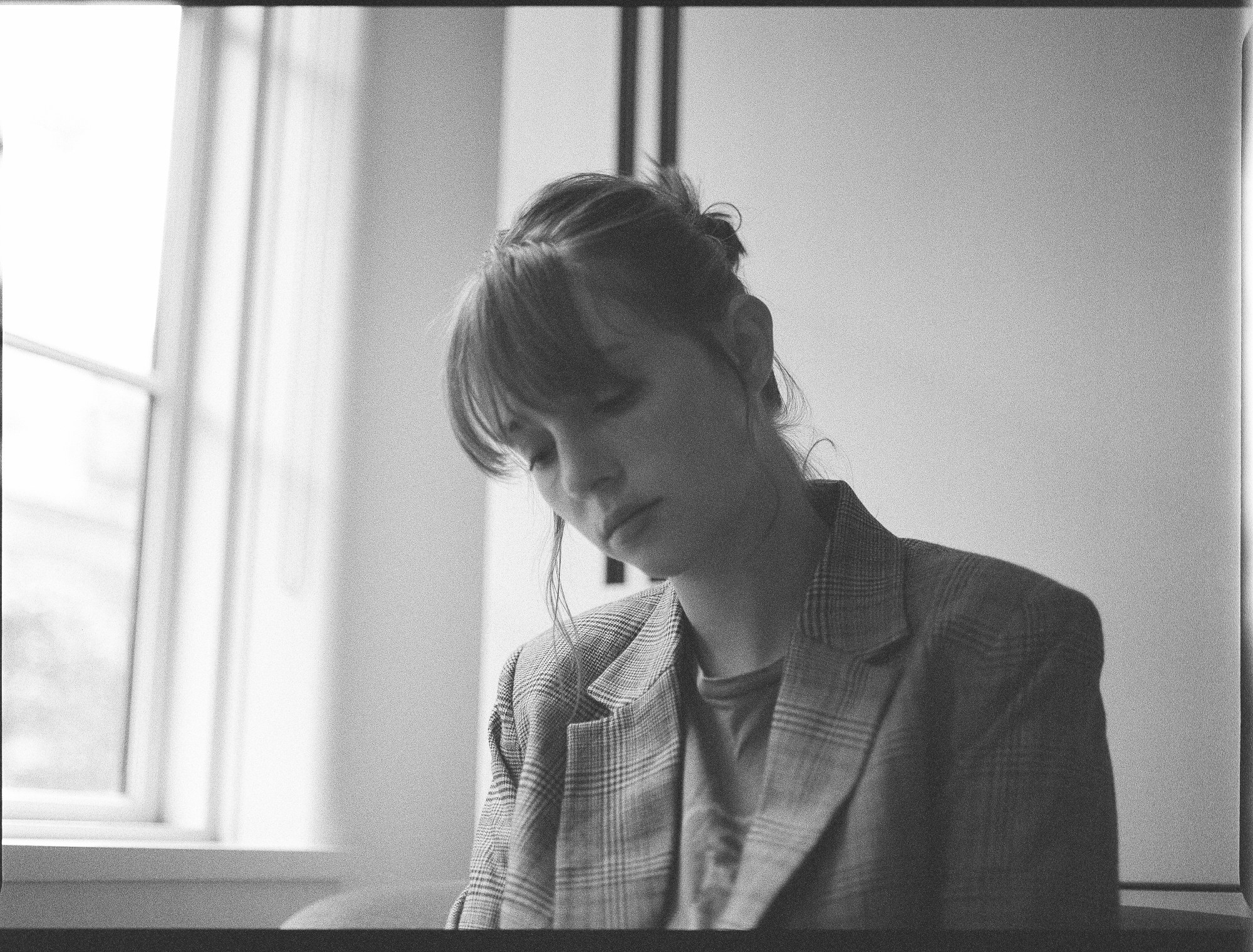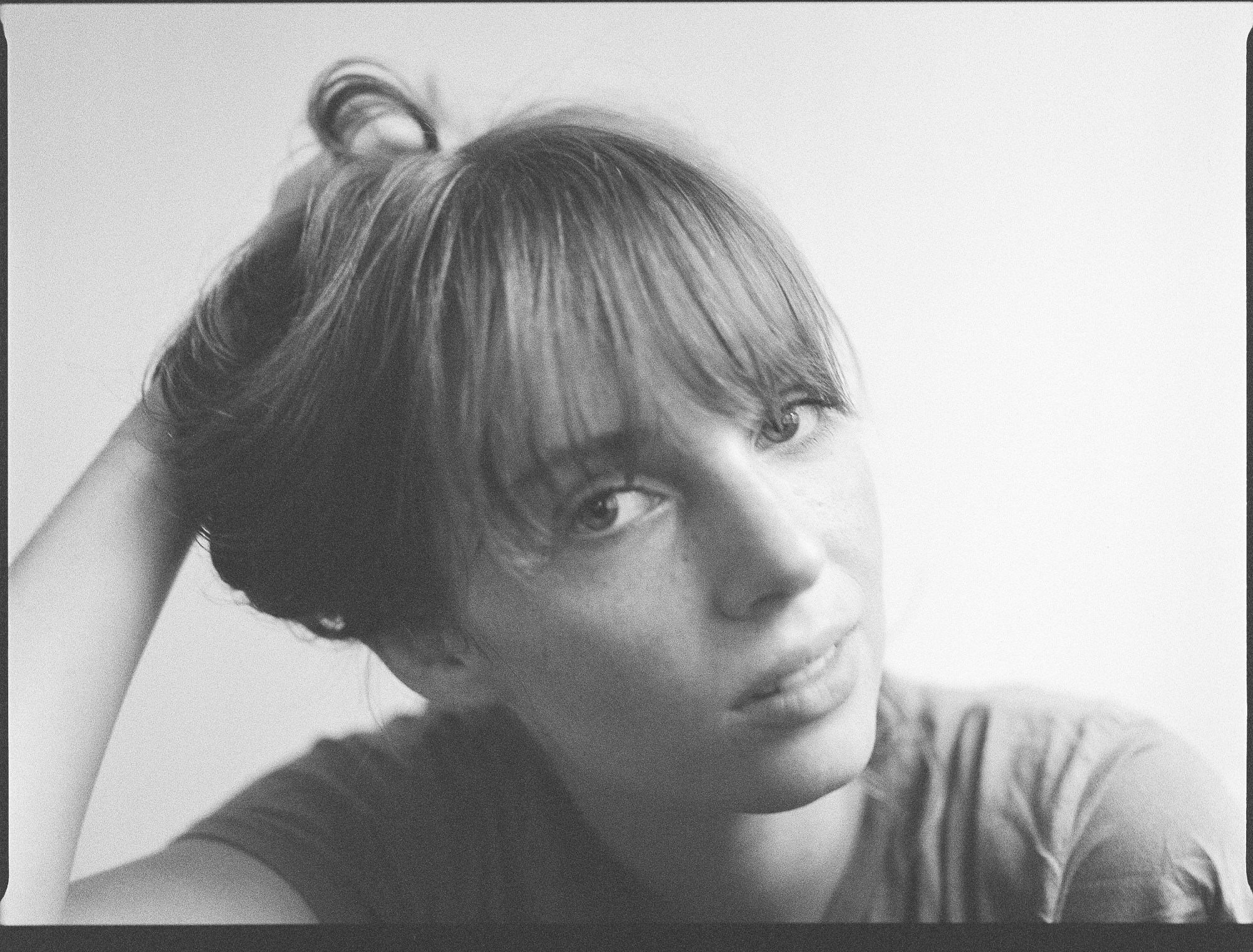At the southernmost tip of Sweden lies Smygehuk, a fishing community and harbour with an unbroken horizon. Overlooking the harbour stands a statue of Maya Hawke‘s great-grandmother Birgit Holmquist, totally naked, with her hair blowing in the wind and arms outstretched to embrace the sea. 22-year-old Maya (daughter of actors Uma Thurman and Ethan Hawke) has never visited the statue, created by artist Axel Ebbe, but knows its story. “Apparently it has a different face to her face,” she tells us over Zoom from her family home in upstate New York. “Because she didn’t want her parents to know that she was posing for the artist… but it’s her body!”
The last time Maya was in Sweden, where half of her mother’s family are from, she was with dad Ethan, who helped her with her final audition tape for the 2017 BBC adaptation of Little Women — her first professional acting credit. “I got the job while we were there, so we went out and had champagne and we celebrated,” she says. “I love Sweden! I’m an eighth Swedish? A quarter Swedish? Something like that.” Since bagging the dream role of tenacious Jo March at 19 (for which she dropped out of her acting course at Julliard), Maya has gone on to star in Quentin Tarantino’s Once Upon a Time… in Hollywood, Gia Coppola’s forthcoming Mainstream, a handful of indie movies, and of course Netflix’s Stranger Things in which she completely owns the role of queer Scoops Ahoy-server-turned-Russian-codebreaker Robin.
She was down in Georgia with the rest of the gang filming Season 5 of the series when lockdown orders were issued. “We’d done like two weeks… of an infinite amount of weeks,” she remembers. “Every day of filming it was like ‘Will it all be over today?’ It definitely felt like the world was shutting down, so we were wondering when it was going to be our turn. What was more shocking, in a slower way, was that we didn’t go back. I mean, I really thought it was gonna be two weeks or something. And it really hasn’t been two weeks. It’s been five months. Everything is pushed forever, basically.”

Since then, Maya has been heading back and forth between her mom’s, her dad’s and her apartment in New York. Shifting between different lives — your past and present — can take some adjusting to at the best of times, but during the pandemic Maya has found herself repeatedly stripped of her newfound independence and thrust back into her childhood. “And which one really is real life?” she asks. “I’m always juggling, trying to figure out what kind of person I am.”
“I’ve sort of been ‘running’ since my senior year of high school,” she explains. “I realised what I wanted to do and then I just started running towards it, so it’s been interesting to take a moment to grapple with the reality that I’ve built for myself and figure out in which ways I want it to change and in which ways I’m happy with how it is.”
For the past few years — since heading to Ireland to shoot Little Women in fact — Maya’s had another creative outlet: music. It’s a love that was instilled in her by her dad, who provided her with a constant flow of mixtapes when she was growing up. “It was a big part of the language of communication of my childhood,” she remembers. I wonder what it is that music gives Maya that acting doesn’t. “Agency, probably,” she says, not missing a beat. “Control. And the ability to do it on my own schedule. To me, there’s a lot of similarities between acting and music. They come from a similar wellspring in myself: the desire to communicate, the desire to connect, a love of language and storytelling. With acting, you’re always auditioning and waiting for someone to give you the opportunity to do it. But the great thing about music is that you don’t have to wait for anyone to give you permission, you just do it.”
In returning to the guitar-playing and songwriting she started in her early teens, Maya found a way of dealing with the difficult feelings of inadequacy she was experiencing. “I really struggled with being like, God… did I do my best today? I didn’t do an audition, there was no one to talk to and nothing to do. And then lying in bed with anxiety and self-hatred and shame. But with music, I can be like, I did something today! I wrote a song, or I practised playing guitar. And that created a different relationship with myself, a better one.”
Maya delves into those emotions on her timeless debut album, Blush. “I am a person who really struggles with embarrassment and shame,” she says, “but it’s such a weird thing to talk about. There’s something embarrassing about even talking about being embarrassed. And the word blush, or blushing, to me is this sort of feminised take on embarrassment. Someone will be like, ‘Oh it’s so cute, you’re blushing!’ But on the inside, you’re dying. I liked the idea of taking this feminised word for shame, and making it the album title — because I struggle with both the feminisation of it, and the thing itself.”
The word ‘blush’ shows up on the record’s third single “Coverage” too, when Maya sings of how “there are things you can’t replace / with blush or bruise or lights or greys”. The lyric refers to a discovery she made through acting, that “there are elements of human experience that two actors need to go through together when they’re telling a story, that you can’t really fake with lighting or tricks or make-up. You have to be alive in that moment with that other human being to make that spark, and to make that story feel real.” It’s that duality — how ‘blush’ can be a mask but also an exposure — that meant a lot to Maya.
Across twelve very classic, very grown-up sounding country songs Maya explores her identity through lyrics about love, self-sabotage and ultimately finding herself. Two of her sisters provide backing vocals on a few tracks, bringing an innocence to mature subject matters. “Something that feels really important to me — and the record is sort of all about this — is how, even as you grow up and start to go through more ‘adult’ experiences, you’re still a kid,” Maya explains. “You’re still the same person that you always were. And so there’s the need to remember that throughline of your own humanity. I wanted to have those children’s voices to add a reminder of ‘this might sound like a woman’s voice, but this whole childhood life is connected through all these stories’.”
This is especially relevant given that some of the lyrics on the album were written by Maya as poetry when she was just a child. “I wasn’t really a musician before I started making this record,” she says. “And I didn’t really make it on purpose. It’s more a collection of individual songs.” The nostalgic, early Laura Marling-esque “River Like You” was one of the first to be written, while “Generous Heart” (the album opener), “So Long” and “Animal Enough” were later additions. “I can really hear the changes that I went through as a producer and arranger of things,” she says. “But I can also trace a different journey through the lyrics, in the way that I was growing as an individual.”
The aforementioned “Generous Heart” — a gorgeous slide guitar-laden country track born from a poem about love that Maya wrote when she was a senior in high school — is the song she’s most excited for people to hear. Then there’s the song that means the most to her: “Goodbye Rocketship”, which is based on a poem she wrote to get out of trouble with her dad back in her teens, and focuses on their relationship. “My dad was very mad at me because I had lied to him about where I was, so I wrote him this song,” she explains. “The only lyric that remains the same is ‘you don’t know how to raise me anymore than I know how to grow up’. And in the same way that I use the children’s voices, there’s something about that continuity of self — that something I wrote when I was 14 is still something I’m working through now. And though I grew up more, the fundamental feeling at the core of the song is the same that I was having when I was 14.”
Maya has complicated feelings about one of the most sonically interesting songs on the album, “Menace”. When she wrote it, she tells us, “I was in a relationship with somebody who really felt like I was not being a good person; who felt like I was behaving badly. In that moment I was like, ‘shoot! I’m sorry. I don’t want to do that anymore’. But in retrospect, I think that they were being controlling and that they were gaslighting me a little bit.” Contrary to other songs, Maya feels removed from its message. “I’m like, ‘God, who was the person who wrote that song?!’” She has the same feelings about the honestly pretty horny “Animal Enough” (“I’m like: when did I feel that confident?!”) and notes that it’s almost as though some songs “are about characters that don’t feel like me anymore”.
The album closer “Mirth” feels especially like her though. The last song recorded for the project, it’s the perfect one to end on: future-facing and optimistic. Maya wrote and played it entirely herself (“which is why the guitar sounds so terrible!” she half jokes). The final verse — the very end of the record — is based on an intense dream she had where she went from performing an erotic exhibitionist artpiece on an airplane to coughing up her own heart. “I was holding my heart in my hands and it was still beating, and all of a sudden I could breathe again and my lungs filled up with air and I felt OK. My heart wasn’t even in my body but I felt more alive than I did when it was. And I woke up from that dream and there was something miraculously independent to me about that. It felt like such a relief: that feeling of having your own heart in your hands and being free.”
With just a few days to go before Blush is out, Maya feels the pressure of its impending release. “It’s terrifying,” she says. “No one should ever share anything with anybody, or show anything to anybody. Everything’s great when you make it privately, and then all of a sudden you’re like ‘oh, it’d be great to share it!’ And you go to share it and it’s very scary indeed.” Definitely worth it though.

